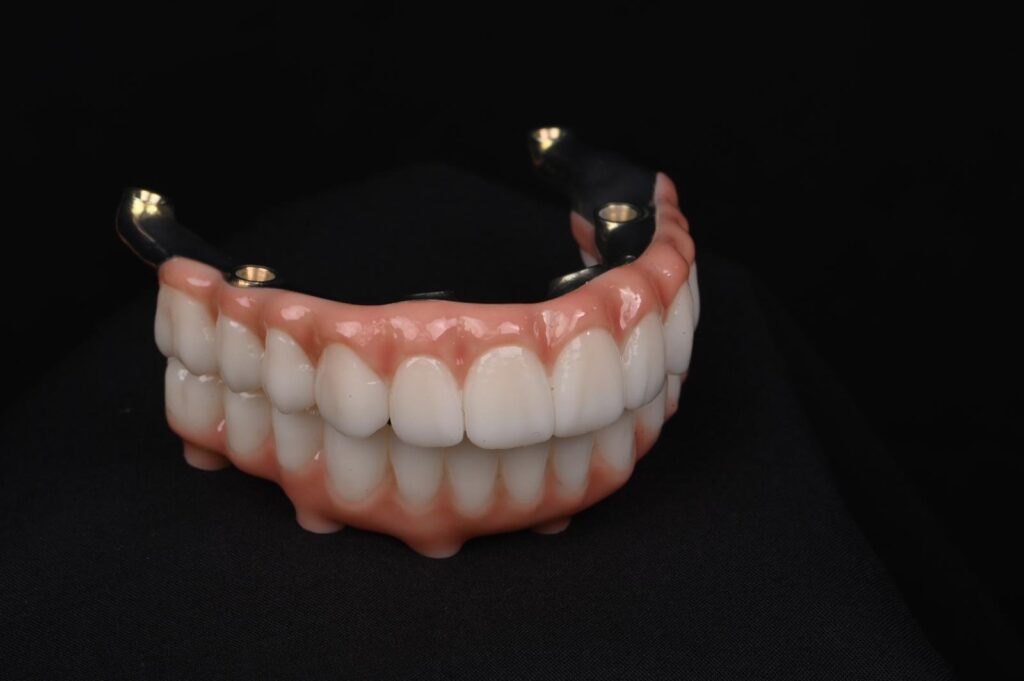Getting a full set of dental implants is a transformative process that restores function, confidence, and aesthetics. However, one of the most important questions for patients is the duration of the entire procedure. How long does a full teeth implant take from start to finish? The answer depends on your individual oral health, the type of implant system used, and the treatment protocol your dentist follows.
In general, the complete process for a full mouth implant can take anywhere between 3 to 8 months, spread across two visits. In certain cases, newer technologies may allow same-day implants, but these are not suitable for every patient.

What Will You Read?
Standard timeline for full teeth implants
The traditional and most common method of full teeth implants follows a staged treatment protocol. This means the procedure is completed in multiple phases, ensuring proper healing, bone integration, and long-term success.
| Stage | Duration in Clinic | Time Between Visits |
|---|---|---|
| First Visit | 5 to 7 days | |
| Healing Period | 3 to 6 months | |
| Second Visit | 7 to 10 days |
First visit: surgical stage
During your initial visit, several key steps are completed:
- Full oral examination
- 3D digital imaging and panoramic x-rays
- Extraction of any damaged or decayed teeth
- Bone graft or sinus lift (if necessary)
- Surgical placement of implants
- Placement of temporary prosthetic teeth
This visit typically requires 5 to 7 days in the clinic. You leave with functional temporary teeth, allowing you to eat and speak while your jawbone heals.
Healing phase
After the first visit, the implants need time to fuse with the jawbone in a process known as osseointegration. This phase is critical for long-term stability.
- Duration: 3 to 6 months, depending on bone quality and overall health
- Patients return home during this time
- You continue using temporary prosthetics
- Regular check-ins with your clinic (virtual or local) may be required
Maintaining oral hygiene and avoiding smoking, hard foods, or trauma is vital during this stage.

Second visit: restorative stage
After osseointegration, you return to the clinic for final restoration:
- Impressions and bite measurements
- Fabrication of permanent prostheses (crowns or bridges)
- Fitting, alignment, and adjustments
- Final polish and aftercare instructions
This phase usually takes 7 to 10 days, especially if the clinic uses in-house dental labs to speed up the production process.
Factors that affect the timeline
The duration of a full teeth implant procedure is influenced by several individual factors:
- Bone health: Patients with strong jawbones heal faster and may not need grafting
- Grafting or sinus lifts: These add healing time, sometimes extending the total timeline to 8 months
- Upper vs. lower jaw: Upper jaw often takes longer to integrate implants due to softer bone
- Number of implants: More implants may require additional surgery time
- Immediate load vs. traditional: Immediate load implants speed up the process for eligible patients
Your dentist will provide a personalized treatment plan with a clear timeline based on these factors.
Is it possible to complete implants in one trip?
Some clinics offer immediate load or same-day full mouth implants, often using systems like All-on-4 or All-on-6. In this method:
- Implants and temporary teeth are placed on the same day
- Permanent teeth are added later, sometimes remotely or in a shorter second visit
- Suitable only for patients with excellent bone health and no infections
This option reduces total treatment time but is not universally recommended. It carries higher risks if healing is not optimal.
How to plan your time effectively
If you are traveling abroad, especially to destinations like Turkey, proper scheduling is essential. Here’s how to plan:
- First trip: Allocate 1 week for diagnostics, surgery, and recovery
- Healing period: 3 to 6 months back in your home country
- Second trip: Allocate 1 to 2 weeks for impressions, fabrication, and fitting
Add flexibility in your schedule in case of adjustments or delays. Most clinics will assist with accommodation, airport transfer, and translation if needed.
Average total duration comparison
| Treatment Type | Total Time Required | Number of Visits |
|---|---|---|
| Traditional full implants | 4 to 8 months | 2 |
| Immediate load implants | 1 to 2 months | 1 or 2 |
| Mini implants | 2 to 3 months | 2 |
It is important to remember that longer does not mean worse. Taking the necessary time for each stage often leads to better long-term results.
Why time investment is worth it
While the idea of multiple months may seem daunting, full mouth implants are one of the most life-changing treatments in modern dentistry. Investing time ensures:
- Better stability and function
- Improved bite and speech
- Natural-looking aesthetics
- Long-lasting results (often 20 years or more)
- Lower risk of implant failure
Rushing the process or choosing shortcuts often leads to complications or higher future costs.
Aftercare for long-term success
Once your full implant procedure is complete, the focus shifts to maintenance:
- Brush and floss daily
- Attend regular check-ups
- Use a nightguard if you grind your teeth
- Avoid extremely hard or sticky foods
- Follow your dentist’s specific aftercare plan
With proper care, your full implants can function like natural teeth for decades.
Conclusion
So, how long does a full teeth implant take? On average, 3 to 8 months, with two visits spaced by a healing period. While this may vary depending on personal health and clinical factors, the structured, phased approach offers the highest chance of long-term success.
If you are considering full dental implants, take the time to consult with an experienced clinic. Understand your unique treatment plan, healing needs, and travel schedule. Time spent planning and healing properly leads to a confident, stable, and beautiful smile that will last for years.

 Dijital Performans Ajansı.
Dijital Performans Ajansı.